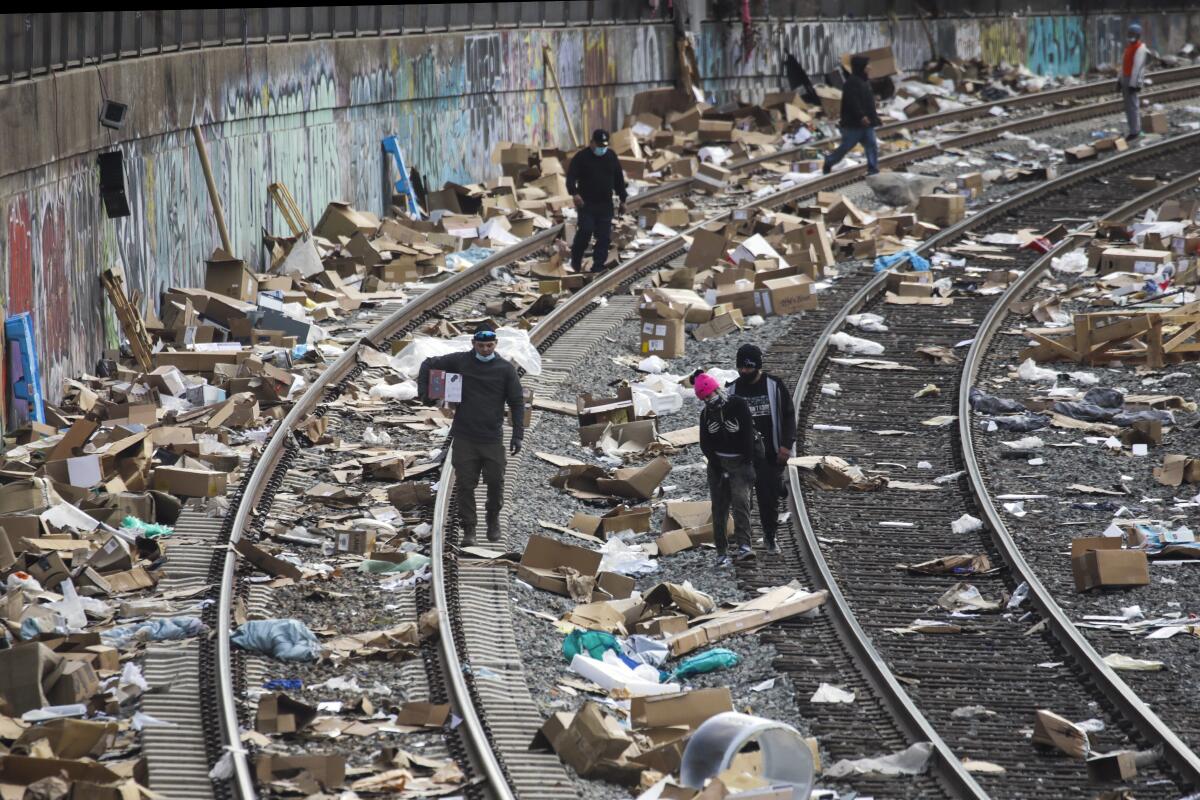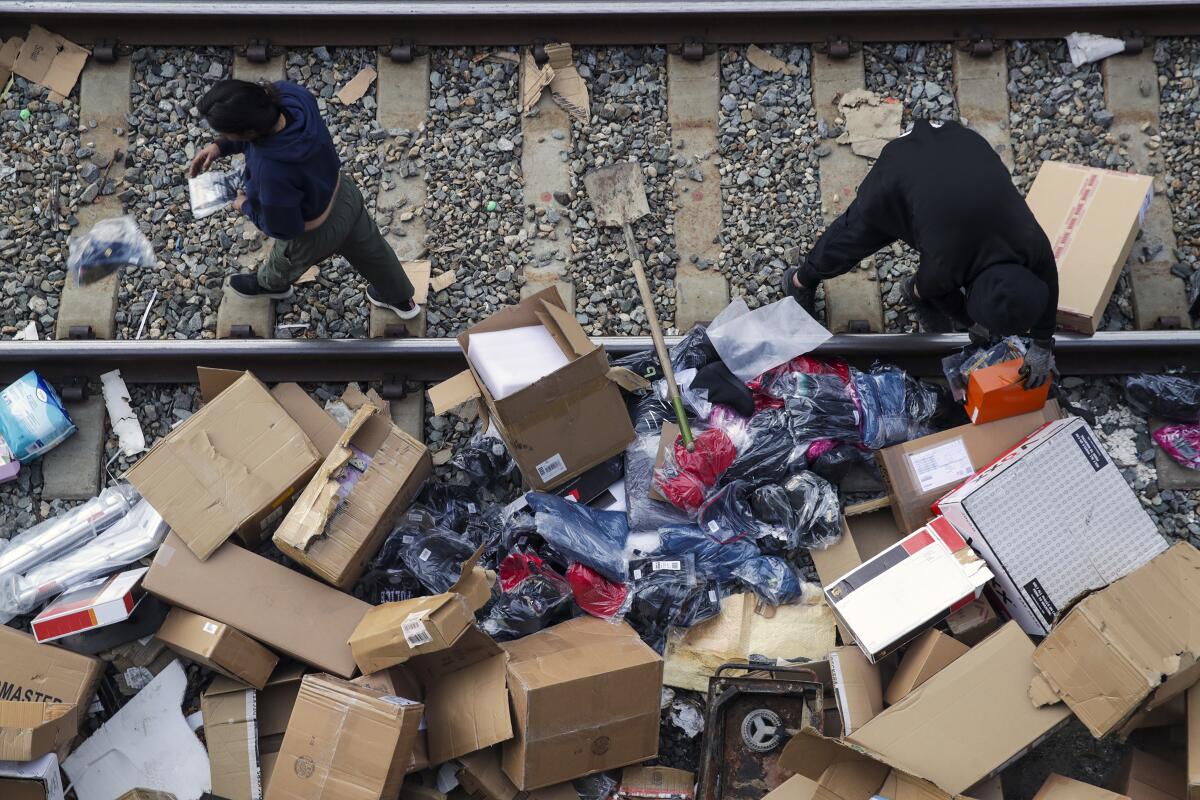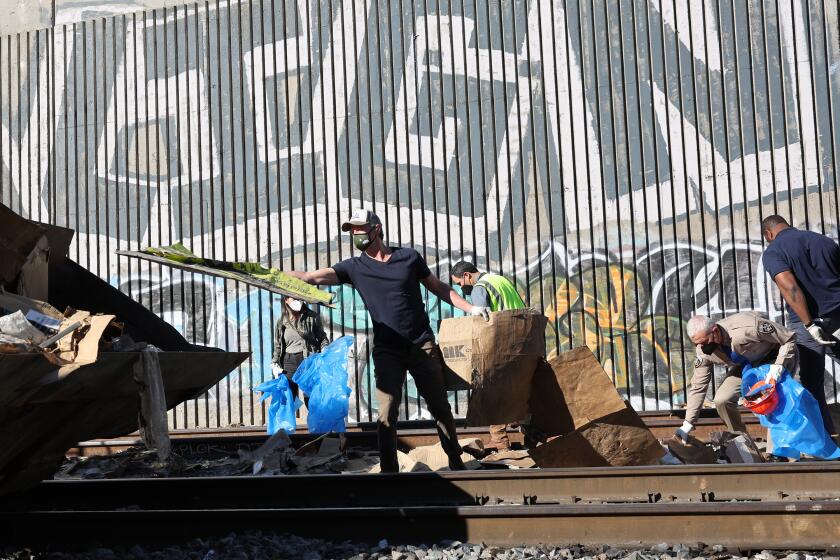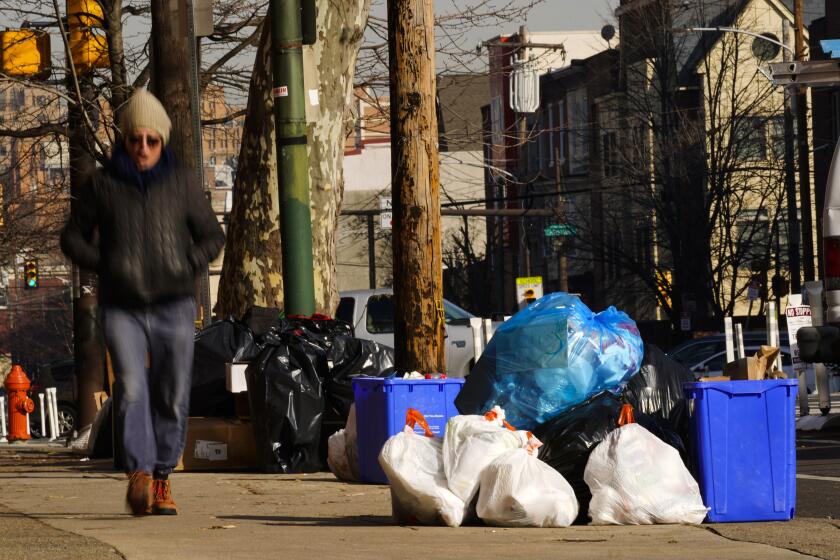‘It’s ugly out there’: Rail thefts leave tracks littered with pilfered packages

- Share via
The scene was a stretch of railroad tracks in Lincoln Heights on Saturday: a blizzard of torn plastic wrappers, cardboard boxes and paper packaging attesting to a wave of rail car thievery that officials say has been on the rise in recent months.
Several scavengers picked through the debris, hoping to find electronics, clothes or whatever valuables thieves left behind.
“Everything comes on the train — cellphones, Louis Vuitton purses, designer clothes, toys, lawnmowers, power equipment, power tools,” said a 37-year-old man who declined to give his name. He said he comes to the tracks regularly and once found a Louis Vuitton purse and a robotic arm worth five figures: “We find things here and there, make some money off of it.”
Thieves are pilfering railroad cars in a crime that harks back to the days of horseback-riding bandits, but is fueled by a host of modern realities, including the rise of e-commerce and Southern California’s role as a hub for the movement of goods.
The images have generated national attention and revealed tension among rail operators, government officials and authorities over what can be done to reduce the thefts.
Union Pacific has reported an alarming 160% increase since December 2020 in thefts along railroad tracks in L.A. County.
Later Saturday, approximately 17 cars on a Union Pacific train derailed in “the same area where the vandalism has been occurring,” said Robynn Tysver, a Union Pacific spokesperson. The crew was not hurt and the cause is under investigation, Tysver added.
Union Pacific reported what it claimed was a 160% increase since December 2020 in thefts along the railroad tracks in L.A. County. The railroad didn’t release specific data on what was stolen or the value of what was lost but it said the increase in crime cost the company at least $5 million last year.
A bottleneck in the supply chain and the presence of homeless encampments near rail lines have contributed to the thefts, officials said.
“Organized and opportunistic criminal rail theft ... impacts our employees, our customers in the overall supply chain industry,” said Adrian Guerrero, a director of public affairs for Union Pacific.
Guerrero estimates that about 90 cargo containers a day are compromised, sometimes by an organized group that has halted trains and recruited people living on the street to ransack the containers.
Union Pacific is deploying more drones, has brought in extra security and enlisted the Los Angeles Police Department, California Highway Patrol and the Los Angeles County Sheriff’s Department to combat the thefts, Guerrero said.
But Union Pacific is partly to blame for not deploying more security, said Los Angeles Police Capt. German Hurtado, who works in the Hollenbeck Division.
“We have millions of dollars of items and equipment, but it is unpoliced,” Hurtado said. “There are even sometimes weapons on these trains. Everything goes by train, you learn.”
The problem gained attention last week when KCBS and KCAL photojournalist John Schreiber posted a series of videos and tweets, including one of himself picking through discarded packages strewn along a rail line in Lincoln Heights.

He plucked out a discarded coronavirus test and a box of REI merchandise along tracks plastered with the detritus of packages intercepted and torn into well before reaching their destinations.
“Missing a package? Shipment delayed? Maybe your package is among the thousands we found discarded along the tracks,” Schreiber wrote on Twitter, alongside an aerial shot of the littered tracks. The posts went viral, as others posted their own photos.
Though Los Angeles has seen a significant increase in homicides over the last two years, property crimes like the rail thefts are a different story. According to LAPD data through Nov. 27, property crime was up 2.6% over the same period last year but is down 6.6% from 2019.
Along the tracks Saturday, a couple who said they showed up after seeing an Instagram post scanned the crush of abandoned cartons looking for something valuable. An Xbox package had caught their eye. Another man who had been waiting for a bus stopped to rummage through the debris. He found some car speakers he figured he could sell for $200 to make up for the hours he missed at work that day.
“It’s ugly out there,” the LAPD’s Hurtado said.
The Omicron variant is forcing cities to delay or suspend garbage and recycling pickups, angering residents.
In a letter to Dist. Atty. George Gascón, Union Pacific’s Guerrero estimated that more than 100 people had been arrested but they “boast to our officers that charges will be pled down.”
Alex Bastian, an advisor to Gascón, said the district attorney’s office had filed charges in some burglary and grand theft cases, but other cases don’t have enough evidence to prosecute.
Lena Kent, a spokesperson for BNSF Railway, a major operator in Southern California, said somebody was depending on those stolen items. “These are not victimless crimes, particularly when many of these packages include much-needed supplies,” she said.
The ports of Los Angeles and Long Beach handle about 40% of the nation’s maritime imports. The majority of the nearly $450 billion in goods moved at the ports eventually land on a train.
Dumping, trash and encampments around railroad tracks last year prompted Los Angeles Councilman Joe Buscaino to call for the city to declare them a public nuisance. But the effort was dropped after Union Pacific cleaned up a swath of tracks, said his spokesperson, Branimir Kvartuc.
Still, Buscaino said, Union Pacific needs to hire more agents to patrol the tracks. “It’s no surprise we are seeing the additional crimes,” he said in a text, adding that the problems had been “unabated for years.”
Like many in L.A. who are shot in senseless gunfire, Arroyos was of this city, a young man who had a life to live, only to have it snatched away.
The biggest problem is around two rail yards where cargo is transferred from trucks onto trains or vice versa. One of those yards is a sprawling rail facility that sits just east of downtown off the 5 Freeway in Lincoln Heights.
Keith Lewis, vice president of operations for CargoNet, a company that tracks cargo thefts, says figuring out just how much is stolen from trains is difficult because much of it is unreported.
Union Pacific operates about 3,200 miles of railway in California and BNSF has 2,100 miles. In Southern California, many of those tracks abut businesses and homes in low-income communities such as Wilmington and Lincoln Heights. In El Sereno, where crime has been increasing, barbed-wire fences line the street-level train tracks.
“It is not like we have given up on it. We do task forces with the sheriff, other agencies along the tracks and make arrests,” Hurtado said.
More to Read
Sign up for Essential California
The most important California stories and recommendations in your inbox every morning.
You may occasionally receive promotional content from the Los Angeles Times.
















